
The University of Oklahoma is the only higher educational institution, public or private, in the state of Oklahoma to offer a doctoral degree in political science. This full-time program accepts students with and without a master’s degree. Graduate students will find a rigorous research-based program offering a range of political science field specializations. Graduates are well-prepared for both teaching and research careers in political science as well as the public and private sector.
This full-time program accepts students with and without a master’s degree. Graduate students will find a rigorous research-based program offering a range of political science field specializations. Graduates are well-prepared for both teaching and research careers in political science as well as the public and private sector.
The doctoral degree in political science is a full-time graduate program for students interested in building a strong theoretical foundation in the science of politics as well as advanced training in political methodology. Our faculty is comprised of award-winning teachers, researchers, and practitioners pursuing active research in a variety of political science fields. As one of the most academically diverse, well-established doctoral programs in the region, our one-on-one interaction between graduate students and faculty play a significant role in the intellectual life of the department. We offer a range of field specializations with faculty strengths in American politics, public administration, public policy, and political methodology.
Our students work closely with faculty, co-authoring publications through collaborative research. Faculty regularly supervise individualized research courses, coordinate lecture series, and facilitate special topic forums focused on political science trends and research, as well as guiding students in the process of professional socialization. We find many of our recent graduates complete the program within 4-6 years and obtain job placements as faculty, researchers, and administrators in academia, among other careers in the public and private sector.
Graduate Studies Brochure (pdf)
Application Deadline for fall 2026 is February 1, 2026.
The fall 2026 admissions application for the PhD in political science is now open.
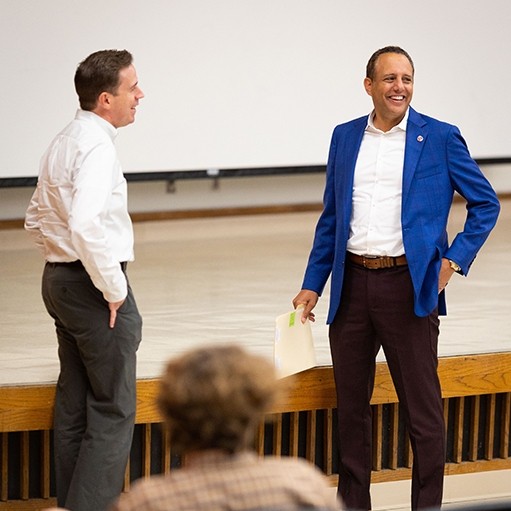
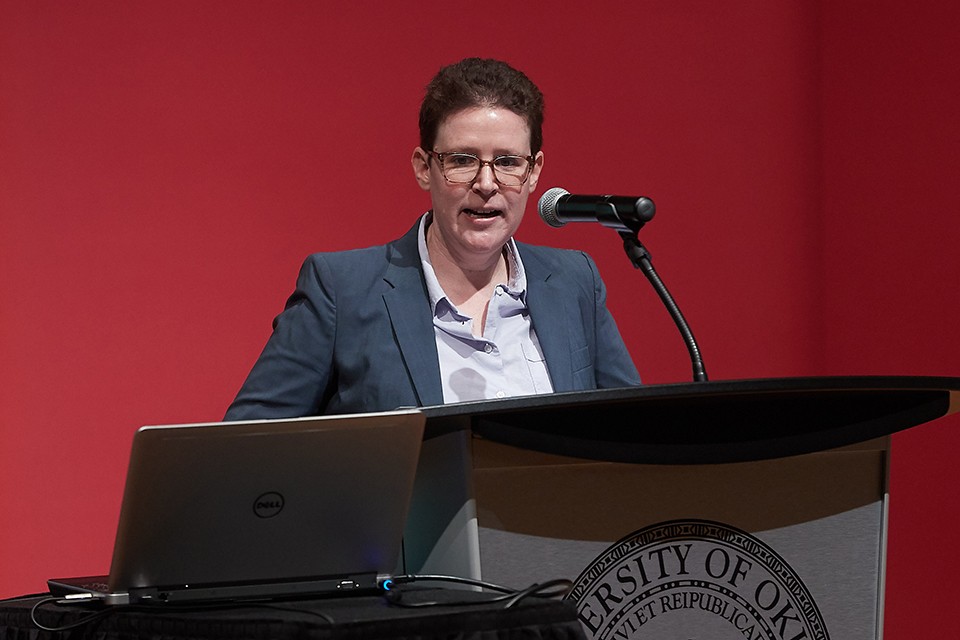
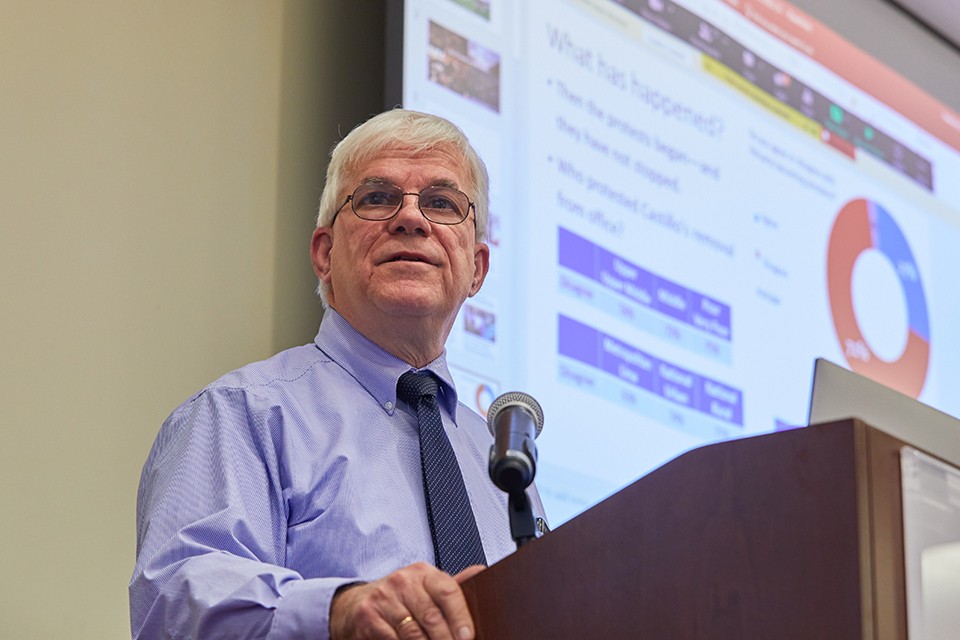
Admission decisions are announced around March 1st.
To seek admission, students must apply directly to OU Graduate College Admissions by submitting the official online application, along with transcripts, application fee, and additional departmental required application materials, as detailed below.
All applicants for whom English is a second language must present evidence of proficiency in the English language. Students whose native language is not English are required to submit their scores on the Test of English as a Foreign Language (TOEFL). The TOEFL institutional code for the University of Oklahoma is 6879. Please consult the Office of Graduate Admissions English Proficiency Requirements for more information.
Application for admission to the political science doctoral program is highly selective. Applicants must demonstrate the ability and motivation to succeed in a rigorous program of graduate study, and must make the case that there is a close fit between their aspirations and the offerings of the Department of Political Science at OU. Furthermore, study for the PhD is a full-time endeavor that demands complete intellectual commitment. Outside employment is not permitted while enrolled in the doctoral degree program in political science.
The admissions committee review applications once annually, following the February 1 deadline. Only complete applications are considered. In reviewing applications, the admissions committee undertakes a comprehensive examination of all elements of the application file. In addition to the graduate admissions application described above, applicants must submit the following supplemental materials with their online application:
All supplemental documents may be uploaded with the online application. All transcripts, test scores, correspondence, or any other supplemental material submitted in conjunction with an application for admission become the permanent property of the University of Oklahoma, and will not be returned to the applicant. Should you need copies of your transcripts for other purposes, you must obtain them from the originating institution(s).
The admissions committee request that prospective applicants do not send unsolicited email attachments (i.e., transcripts, résumé, recommendation letters, test scores) when requesting information about our graduate degree programs. The venue to submit such materials is through formal submission of your application to Graduate College Admissions.
Minimum of 90 hours beyond a baccalaureate (master's degree not required)
Required Courses:
P SC 5923 (Introduction to Analysis of Political and Administrative Data)
P SC 5933 (Intermediate Analysis of Political Data)
P SC 5950 (Research Problems)
P SC 6003 (Political Science: Survey of a Discipline)
Concentration in three of seven fields:
A minimum of 9 hours of course work in three concentration fields: including certain required courses in each concentration field.
American Politics
Comparative Politics
International Relations
Political Methodology (secondary examining field or non-examining third field only)
Political Theory
Public Administration
Public Law (non-examining third field only)
Public Policy
Other Degree Requirements:
Up to 12 hours may be taken from departments other than political science, with not more than 6 hours from any other department or not more than 6 hours to be applied to any one field of study.
Comprehensive General Examination (written and oral) in first and second primary concentration fields.
Dissertation (2-44 hours, usually not more than 30 hours)
Two semesters in residence (full-time student)


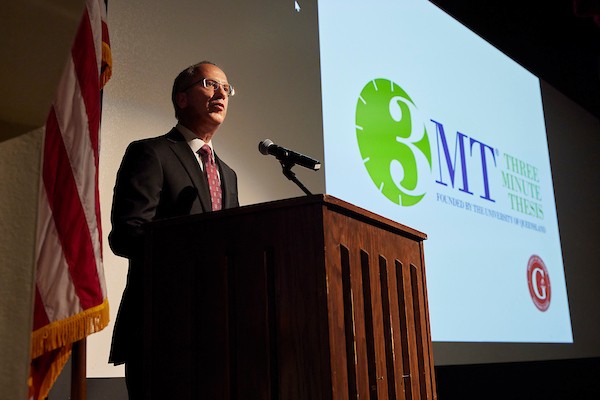
Graduate Teaching Assistantship (GTA)
The University has made it a priority to increase Graduate Teaching Assistantship (GTA) stipends. Beginning fall 2024, a standard GTA stipend paid over nine months for a political science doctoral student is $20,000 and $17,500 for a master’s student. When available the financial support package typically includes a competitive stipend, graduate tuition waiver, and student health insurance. The support package does not cover university and college fees, housing, books, food, travel, and other personal expenses.
The Department of Political Science offers a limited number of multi-year, renewable GTA appointments each year. Students have the opportunity to develop and enhance teaching skills under the guidance of a tenured political science faculty member. A political science GTA will assist in classroom management, provide instructional support, and lead discussion sections for P SC 1113 American Federal Government, a multi-section course required for undergraduate students. The standard GTA employment is .50 FTE*, which is equivalent to 20 hours per week.
All prospective applicants interested in a graduate assistantship should indicate their interest on the admissions application. A separate application is not required. Nearly everyone who is accepted to the doctoral or master’s degree in political science is eligible for funding, but funding depends on how many open positions we have, and the quality of the application as determined by the Graduate Studies Committee.
* GTA employment is generally measured as a proportion of Full Time Equivalent (FTE) or 1.00 FTE status.
Carl Albert Center Fellowships
The highly competitive and prestigious Carl Albert Graduate Fellowship program is for students who are interested in studying legislative politics while earning a PhD in political science. CAC Fellows all share a work space while Center faculty actively mentor graduate students from day one by incorporating them into ongoing research projects. This lab model of training means students pick up the language and professional tools they will need much more quickly, while learning across cohorts and from one another.
The generously-funded program includes:
Institute for Public Policy Research and Analysis Fellowships
The Institute for Public Policy Research and Analysis (IPPRA) is an interdisciplinary team with decades of experience in addressing public policy challenges such as those posed by extreme weather and the changing climate, energy policy, environmental policy, the role of government intervention in pandemics, and national security.
IPPRA offers competitive Graduate Research Assistantships (GRA) to conduct research and data analysis and assist our affiliated faculty across a variety of externally-funded projects that span multiple policy areas. These Graduate Research Assistantships enable students to augment classroom learning; develop new analytical, research and writing skills; and conduct research on complex policy problems for institutions and clients.
IPPRA Graduate Research Assistants also receive annual travel support to offset costs associated with enhancing their ability to successfully complete their doctoral program and prepare for their chosen career paths. Travel support is generally used to attend and present at academic conferences nationwide.
Basic student health insurance and a tuition waiver are benefits that accompany these GRAships. To inquire about current fellowship opportunities, please contact Joe Ripberger, Deputy Director for Research at jtr@ou.edu or Hank Jenkins-Smith, IPPRA Director at hjsmith@ou.edu.
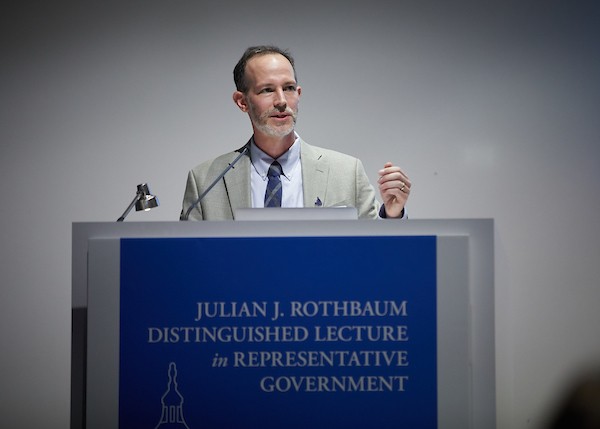
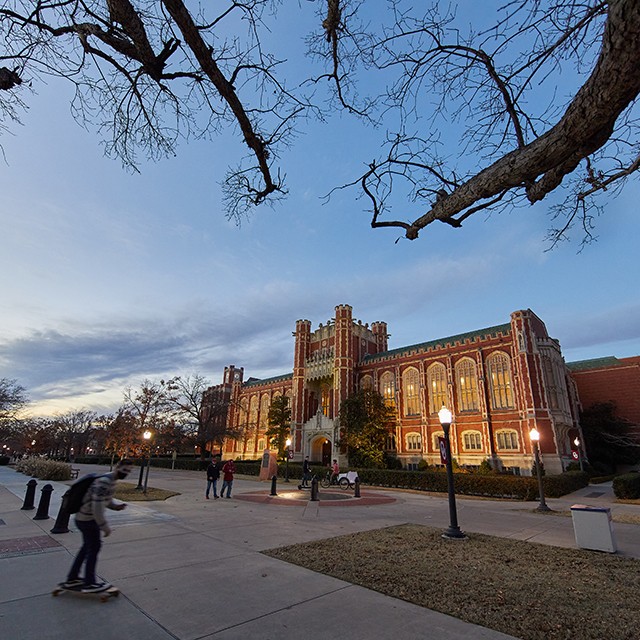

| Last Name | First Name | OU Email Address |
|---|---|---|
| Ahmed | Bulbul | Bulbul.Ahmed-1@ou.edu |
| Ames | J.J. | polisciguru@ou.edu |
| Ashley | Thomas | tom@ou.edu |
| Barron | Nathan | nathanbarron@ou.edu |
| Beake | Georgia | georgialitle@ou.edu |
| Bixler | Derek | wdbixler@ou.edu |
| Black | Cheyenne | cheyenne.alise.black@ou.edu |
| Deboard | Laken | laken.deboard@ou.edu |
| Diodosio | Kaitlin | kaitlin.l.diodosio-1@ou.edu |
| Doherty | Francis | Francis.B.Doherty-1@ou.edu |
| Emini | Renata | Renata.Emini-1@ou.edu |
| Gibson | Aileen | pagibson@ou.edu |
| Godsey | Taylor | Taylor.J.Godsey-1@ou.edu |
| Hill | Richard | rich.hill@ou.edu |
| Jones | Alexis | alexisjones@ou.edu |
| Lavastida | Vicki | vlavastida@ou.edu |
| Lewis | Kellie | Kellie.J.Lewis-1@ou.edu |
| Livingston | William J. | william.j.livingston@ou.edu |
| Manuel | Pedro | manu1@ou.edu |
| Mosharref | Rashed | rashed.mosharref-1@ou.edu |
| Nettrouer | Austin | Austin.D.Nettrouer-1@ou.edu |
| Olson | Peter | peterolson@ou.edu |
| Perez Sandoval | Jennifer | jenniferperezs@ou.edu |
| Reeves | Nathaniel | nathaniel.reeves@ou.edu |
| Rhodes | Joy | joy.d.rhodes-1@ou.edu |
| Wehle | Sophia | Sophia.C.Wehle-1@ou.edu |
| Zararsiz | Alperen | alperenzararsiz@ou.edu |
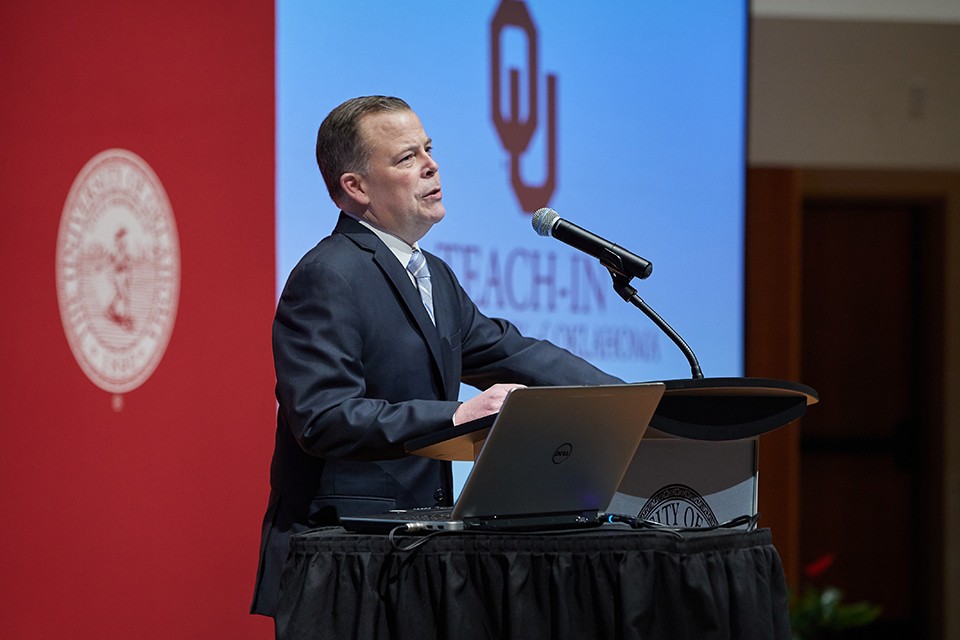
The Graduate Association in Political Science (GAPS) is a registered OU graduate student organization in which membership is reserved to those currently enrolled in the M.A. or Ph.D. in political science degree program at the University of Oklahoma.
Kaitlin Peach - Raymond Frankel Nuclear Security Policy Fellow, American Academy of Arts and Science
Morgan Woodle - Research Associate, Research Institute for Social Equity, Virginia Commonwealth University
Aarika Forney - Kennesaw State University
William L. Livingston - Postdoctoral Research Associate at OU-IPPRA
Peter McLaughlin - The University of Rhode Island
Clinton McNair - Rutgers University - Camden
Johnathan Noah Wolff - University of Cincinnati
Eriech Tapia - Council of Graduate Schools (Gov't Affairs and Public Policy Officer)
H. Benjamin Ashton, III - Oklahoma State Department of Education (Researcher)
Tyler Camarillo - Grand Valley State University
Gloria Noble - Povaddo (Research Manager), (now at the Missouri Department of Economic Development)
John D. Rackey - Select Committee on the Modernization of Congress, US House of Representatives (Professional Staff), (now at the Bipartisan Policy Center)
Travis Ruddle - Brigham Young University
Sarina Rhinehart – Oklahoma State Department of Education (Executive Director of Data Quality & Reporting)
Derek Steiger - Oklahoma City Community College
Junghwa Choi – University of North Carolina at Pembroke, (now at the University of Nebraska-Omaha)
Matthew Geras – University of Illinois-Springfield
Periloux Peay – Georgia State University, (now at the University of Maryland)
Ani Ter-Mkrtchyan – New Mexico State University-Las Cruces
Lihui Zhang - Religious Freedom Institute (Researcher), (now at The Legal Aid Society NYC)
Tracey Bark – Auburn University at Montgomery
Elizabeth Bell – Miami University, (now at the University of Texas at Austin, LBJ School of Public Affairs)
Dylan Billings – Oklahoma State University (Visiting Professor)
Andrew Fox – Center for Risk and Crisis Management (Postdoc), (now at OU-IPPRA)
Wesley Wehde – East Tennessee State University, (now at Texas Tech University)
Daniel Brown – University of Oklahoma (Lecturer), (now at College of Charleston as Visiting Assistant Professor)
Jessica Hayden – Western Carolina University
Jonathan Moore – Oklahoma Department of Human Services (Senior Researcher)
Sondra Petty – Southeastern Oklahoma State University
Christopher Sartorius – University of Oklahoma Department of International and Area Studies (Adjunct)
Ivy Shen – Southeast Missouri State University
Paul Valentine – University of Oklahoma-Tulsa (Visiting Professor), (now at Ohio University)
Jason Pudlo – Oral Roberts University, (now at East Carolina University)
Victoria Rickard – Mercyhurst College, (now at Brownstein, Hyatt, Farber, and Schreck)
David Stroup – University of Manchester (United Kingdom)
Meghann Dragseth – Louisiana State University
Leslie Baker – Mississippi State University
Tyler Hughes – California State University, Northridge
Jamie Smith – University of Oklahoma-Tulsa (Visiting Professor), (now at Tulsa Community College)
Haley Murphy – Oklahoma State University
Sidney T. Ellington – The Warrior Scholar Project, (now at the University of Oklahoma)
Kuhika Gupta – University of Oklahoma, Center for Risk & Crisis Management (Senior Researcher)
Matthew Nowlin – College of Charleston
Caitlyn O'Grady – The College Board
Thomas Rabovsky – Indiana University at Bloomington
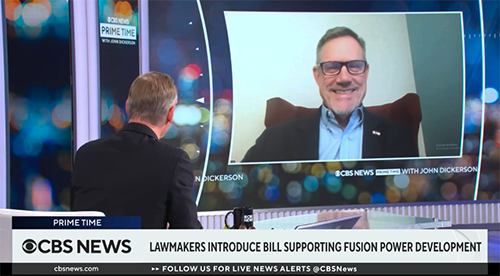
Dr. Hank Jenkins-Smith speaking via Zoom with CBS News.